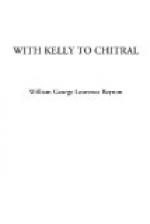“Why do you want to cross the river?” said Humayun.
“I want to see the end of the nullah,” said I.
“Their cavalry will get you,” said he.
“What cavalry?” said I.
“You’ve just seen two of them,” said he.
“Get out!” said I; “you’re pulling my leg.”
“Don’t go,” said he.
“I’m going,” said I.
“Where the Sahib goes, I follow,” said he.
“Come on, Ruth,” said I. “‘Whither thou goest, I will go!’ I’ve heard that remark before.”
These hillmen have an extraordinarily exaggerated idea of cavalry. Any young buck on a long-tailed screw is a Chevalier Bayard to them. Why, you’ve only to move ten yards to your right or left in any part of the country, and no cavalry could reach you, while you could sit and chuck stones at them.
Down we dropped again into the river bed, leaving a few men to signal any movement of the enemy while we were crossing. We had our ponies brought up and rode across the stream, the men fording, then we scrambled up the high slope of the opposite bank and shouted for the remainder to follow.
A short distance up the hill, and I could see the end of the nullah, with a large sangar covering the road. This was what I wished to know, so, after a careful look, having seen all I wanted, we started homewards by the opposite bank to that by which we had come, crossing the river again by a bridge which Oldham had been employed the day before in mending, and reached Mastuj by 1 P.M.
I gave in my report to Colonel Kelly, and then got out orders for the next day’s march.
I also suggested that some light scaling ladders should be made, as I expected we should find them very useful in crossing the Nisa Gol. Accordingly, Oldham set his Sappers to work, and by evening had ten light scaling ladders ready, each about ten feet long, and light enough to be carried by one man.
A certain amount of supplies and some coolies had been collected. The guns had been mounted on ponies, and could now march along faster than when carried by coolies.
Everything was ready for an early advance the next morning, so as a little diversion we were photographed by Moberly. Moberly was coming out the next day in command of a company of Kashmir troops; after the expected fight, he would return to Mastuj to resume command, and the Kashmir troops would be put under my charge.
The orders for next day were to march at 7 A.M., baggage to remain in Mastuj till sent for, and then to come out under escort of part of the garrison, who would escort back any wounded we might have, Luard coming out in charge of the field hospital and returning with the wounded to form a base hospital at Mastuj.
I managed to get a bottle of whiskey out of Moberly. It belonged, I believe, to Fowler, but as he was either a prisoner or dead, he wouldn’t require the whiskey. I also replenished my store of chocolate.




